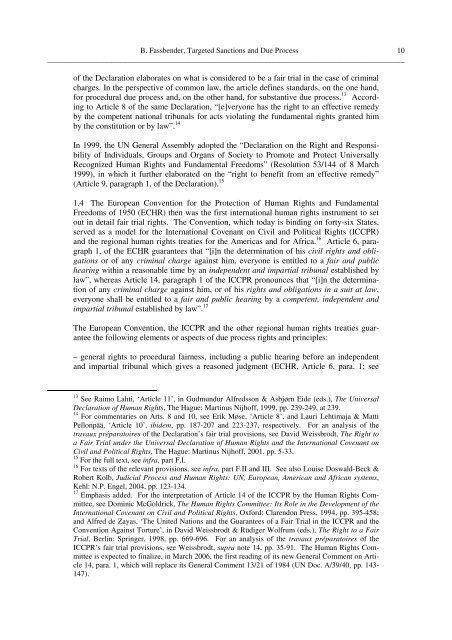Targeted Sanctions and Due Process - United Nations Treaty ...
Targeted Sanctions and Due Process - United Nations Treaty ...
Targeted Sanctions and Due Process - United Nations Treaty ...
Create successful ePaper yourself
Turn your PDF publications into a flip-book with our unique Google optimized e-Paper software.
B. Fassbender, <strong>Targeted</strong> <strong>Sanctions</strong> <strong>and</strong> <strong>Due</strong> <strong>Process</strong><br />
10<br />
______________________________________________________________________________________________<br />
of the Declaration elaborates on what is considered to be a fair trial in the case of criminal<br />
charges. In the perspective of common law, the article defines st<strong>and</strong>ards, on the one h<strong>and</strong>,<br />
for procedural due process <strong>and</strong>, on the other h<strong>and</strong>, for substantive due process. 13 According<br />
to Article 8 of the same Declaration, “[e]veryone has the right to an effective remedy<br />
by the competent national tribunals for acts violating the fundamental rights granted him<br />
by the constitution or by law”. 14<br />
In 1999, the UN General Assembly adopted the “Declaration on the Right <strong>and</strong> Responsibility<br />
of Individuals, Groups <strong>and</strong> Organs of Society to Promote <strong>and</strong> Protect Universally<br />
Recognized Human Rights <strong>and</strong> Fundamental Freedoms” (Resolution 53/144 of 8 March<br />
1999), in which it further elaborated on the “right to benefit from an effective remedy”<br />
(Article 9, paragraph 1, of the Declaration). 15<br />
1.4 The European Convention for the Protection of Human Rights <strong>and</strong> Fundamental<br />
Freedoms of 1950 (ECHR) then was the first international human rights instrument to set<br />
out in detail fair trial rights. The Convention, which today is binding on forty-six States,<br />
served as a model for the International Covenant on Civil <strong>and</strong> Political Rights (ICCPR)<br />
<strong>and</strong> the regional human rights treaties for the Americas <strong>and</strong> for Africa. 16 Article 6, paragraph<br />
1, of the ECHR guarantees that “[i]n the determination of his civil rights <strong>and</strong> obligations<br />
or of any criminal charge against him, everyone is entitled to a fair <strong>and</strong> public<br />
hearing within a reasonable time by an independent <strong>and</strong> impartial tribunal established by<br />
law”, whereas Article 14, paragraph 1 of the ICCPR pronounces that “[i]n the determination<br />
of any criminal charge against him, or of his rights <strong>and</strong> obligations in a suit at law,<br />
everyone shall be entitled to a fair <strong>and</strong> public hearing by a competent, independent <strong>and</strong><br />
impartial tribunal established by law”. 17<br />
The European Convention, the ICCPR <strong>and</strong> the other regional human rights treaties guarantee<br />
the following elements or aspects of due process rights <strong>and</strong> principles:<br />
– general rights to procedural fairness, including a public hearing before an independent<br />
<strong>and</strong> impartial tribunal which gives a reasoned judgment (ECHR, Article 6, para. 1; see<br />
13 See Raimo Lahti, ‘Article 11’, in Gudmundur Alfredsson & Asbjørn Eide (eds.), The Universal<br />
Declaration of Human Rights, The Hague: Martinus Nijhoff, 1999, pp. 239-249, at 239.<br />
14 For commentaries on Arts. 8 <strong>and</strong> 10, see Erik Møse, ‘Article 8’, <strong>and</strong> Lauri Lehtimaja & Matti<br />
Pellonpää, ‘Article 10’, ibidem, pp. 187-207 <strong>and</strong> 223-237, respectively. For an analysis of the<br />
travaux préparatoires of the Declaration’s fair trial provisions, see David Weissbrodt, The Right to<br />
a Fair Trial under the Universal Declaration of Human Rights <strong>and</strong> the International Covenant on<br />
Civil <strong>and</strong> Political Rights, The Hague: Martinus Nijhoff, 2001, pp. 5-33.<br />
15 For the full text, see infra, part F.I.<br />
16 For texts of the relevant provisions, see infra, part F.II <strong>and</strong> III. See also Louise Doswald-Beck &<br />
Robert Kolb, Judicial <strong>Process</strong> <strong>and</strong> Human Rights: UN, European, American <strong>and</strong> African systems,<br />
Kehl: N.P. Engel, 2004, pp. 123-134.<br />
17 Emphasis added. For the interpretation of Article 14 of the ICCPR by the Human Rights Committee,<br />
see Dominic McGoldrick, The Human Rights Committee: Its Role in the Development of the<br />
International Covenant on Civil <strong>and</strong> Political Rights, Oxford: Clarendon Press, 1994, pp. 395-458;<br />
<strong>and</strong> Alfred de Zayas, ‘The <strong>United</strong> <strong>Nations</strong> <strong>and</strong> the Guarantees of a Fair Trial in the ICCPR <strong>and</strong> the<br />
Convention Against Torture’, in David Weissbrodt & Rüdiger Wolfrum (eds.), The Right to a Fair<br />
Trial, Berlin: Springer, 1998, pp. 669-696. For an analysis of the travaux préparatoires of the<br />
ICCPR’s fair trial provisions, see Weissbrodt, supra note 14, pp. 35-91. The Human Rights Committee<br />
is expected to finalize, in March 2006, the first reading of its new General Comment on Article<br />
14, para. 1, which will replace its General Comment 13/21 of 1984 (UN Doc. A/39/40, pp. 143-<br />
147).
















